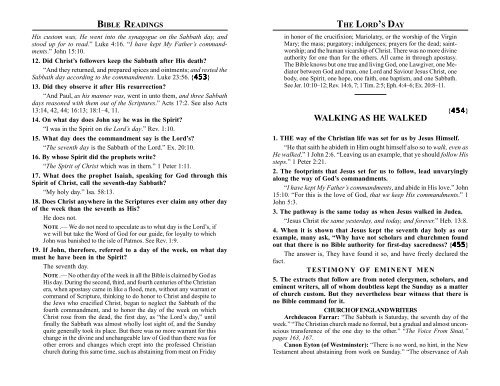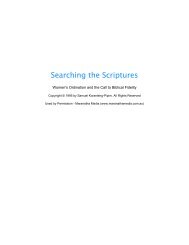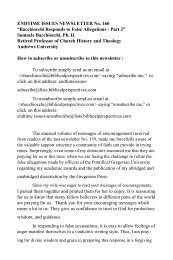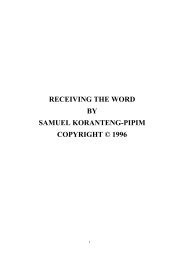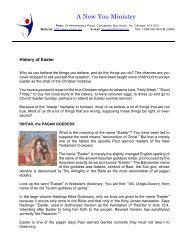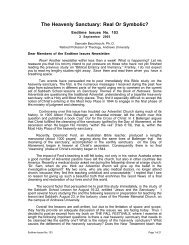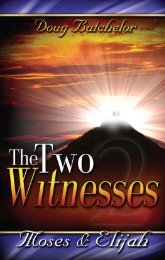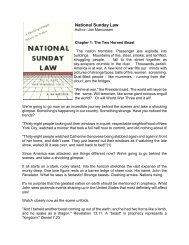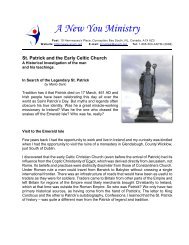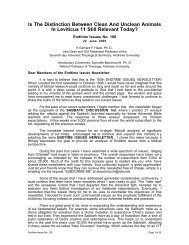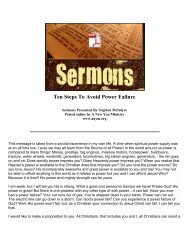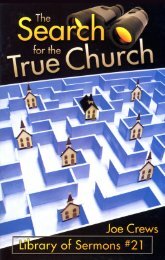Bible Readings for the Home Circleâ1914 - A New You Ministry
Bible Readings for the Home Circleâ1914 - A New You Ministry
Bible Readings for the Home Circleâ1914 - A New You Ministry
You also want an ePaper? Increase the reach of your titles
YUMPU automatically turns print PDFs into web optimized ePapers that Google loves.
BIBLE READINGS<br />
His custom was, He went into <strong>the</strong> synagogue on <strong>the</strong> Sabbath day, and<br />
stood up <strong>for</strong> to read.” Luke 4:16. “I have kept My Fa<strong>the</strong>r’s commandments.”<br />
John 15:10.<br />
12. Did Christ’s followers keep <strong>the</strong> Sabbath after His death<br />
“And <strong>the</strong>y returned, and prepared spices and ointments; and rested <strong>the</strong><br />
Sabbath day according to <strong>the</strong> commandments. Luke 23:56. {453<br />
453}<br />
13. Did <strong>the</strong>y observe it after His resurrection<br />
“And Paul, as his manner was, went in unto <strong>the</strong>m, and three Sabbath<br />
days reasoned with <strong>the</strong>m out of <strong>the</strong> Scriptures.” Acts 17:2. See also Acts<br />
13:14, 42, 44; 16:13; 18:1–4, 11.<br />
14. On what day does John say he was in <strong>the</strong> Spirit<br />
“I was in <strong>the</strong> Spirit on <strong>the</strong> Lord’s day.” Rev. 1:10.<br />
15. What day does <strong>the</strong> commandment say is <strong>the</strong> Lord’s<br />
“The seventh day is <strong>the</strong> Sabbath of <strong>the</strong> Lord.” Ex. 20:10.<br />
16. By whose Spirit did <strong>the</strong> prophets write<br />
“The Spirit of Christ which was in <strong>the</strong>m.” 1 Peter 1:11.<br />
17. What does <strong>the</strong> prophet Isaiah, speaking <strong>for</strong> God through this<br />
Spirit of Christ, call <strong>the</strong> seventh-day Sabbath<br />
“My holy day.” Isa. 58:13.<br />
18. Does Christ anywhere in <strong>the</strong> Scriptures ever claim any o<strong>the</strong>r day<br />
of <strong>the</strong> week than <strong>the</strong> seventh as His<br />
He does not.<br />
NOTE .— We do not need to speculate as to what day is <strong>the</strong> Lord’s, if<br />
we will but take <strong>the</strong> Word of God <strong>for</strong> our guide, <strong>for</strong> loyalty to which<br />
John was banished to <strong>the</strong> isle of Patmos. See Rev. 1:9.<br />
19. If John, <strong>the</strong>re<strong>for</strong>e, referred to a day of <strong>the</strong> week, on what day<br />
must he have been in <strong>the</strong> Spirit<br />
The seventh day.<br />
NOTE .— No o<strong>the</strong>r day of <strong>the</strong> week in all <strong>the</strong> <strong>Bible</strong> is claimed by God as<br />
His day. During <strong>the</strong> second, third, and fourth centuries of <strong>the</strong> Christian<br />
era, when apostasy came in like a flood, men, without any warrant or<br />
command of Scripture, thinking to do honor to Christ and despite to<br />
<strong>the</strong> Jews who crucified Christ, began to neglect <strong>the</strong> Sabbath of <strong>the</strong><br />
fourth commandment, and to honor <strong>the</strong> day of <strong>the</strong> week on which<br />
Christ rose from <strong>the</strong> dead, <strong>the</strong> first day, as “<strong>the</strong> Lord’s day,” until<br />
finally <strong>the</strong> Sabbath was almost wholly lost sight of, and <strong>the</strong> Sunday<br />
quite generally took its place. But <strong>the</strong>re was no more warrant <strong>for</strong> this<br />
change in <strong>the</strong> divine and unchangeable law of God than <strong>the</strong>re was <strong>for</strong><br />
o<strong>the</strong>r errors and changes which crept into <strong>the</strong> professed Christian<br />
church during this same time, such as abstaining from meat on Friday<br />
THE LORD’S DAY<br />
in honor of <strong>the</strong> crucifixion; Mariolatry, or <strong>the</strong> worship of <strong>the</strong> Virgin<br />
Mary; <strong>the</strong> mass; purgatory; indulgences; prayers <strong>for</strong> <strong>the</strong> dead; saintworship;<br />
and <strong>the</strong> human vicarship of Christ. There was no more divine<br />
authority <strong>for</strong> one than <strong>for</strong> <strong>the</strong> o<strong>the</strong>rs. All came in through apostasy.<br />
The <strong>Bible</strong> knows but one true and living God, one Lawgiver, one Mediator<br />
between God and man, one Lord and Saviour Jesus Christ, one<br />
body, one Spirit, one hope, one faith, one baptism, and one Sabbath.<br />
See Jer. 10:10–12; Rev. 14:6, 7; 1 Tim. 2:5; Eph. 4:4–6; Ex. 20:8–11.<br />
WALKING AS HE WALKED<br />
{454<br />
454}<br />
1. THE way of <strong>the</strong> Christian life was set <strong>for</strong> us by Jesus Himself.<br />
“He that saith he abideth in Him ought himself also so to walk, even as<br />
He walked.” 1 John 2:6. “Leaving us an example, that ye should follow His<br />
steps.” 1 Peter 2:21.<br />
2. The footprints that Jesus set <strong>for</strong> us to follow, lead unvaryingly<br />
along <strong>the</strong> way of God’s commandments.<br />
“I have kept My Fa<strong>the</strong>r’s commandments, and abide in His love.” John<br />
15:10. “For this is <strong>the</strong> love of God, that we keep His commandments.” 1<br />
John 5:3.<br />
3. The pathway is <strong>the</strong> same today as when Jesus walked in Judea.<br />
“Jesus Christ <strong>the</strong> same yesterday, and today, and <strong>for</strong>ever.” Heb. 13:8.<br />
4. When it is shown that Jesus kept <strong>the</strong> seventh day holy as our<br />
example, many ask, “Why have not scholars and churchmen found<br />
out that <strong>the</strong>re is no <strong>Bible</strong> authority <strong>for</strong> first-day sacredness {455<br />
455}<br />
The answer is, They have found it so, and have freely declared <strong>the</strong><br />
fact.<br />
TESTIMONY OF EMINENT MEN<br />
5. The extracts that follow are from noted clergymen, scholars, and<br />
eminent writers, all of whom doubtless kept <strong>the</strong> Sunday as a matter<br />
of church custom. But <strong>the</strong>y never<strong>the</strong>less bear witness that <strong>the</strong>re is<br />
no <strong>Bible</strong> command <strong>for</strong> it.<br />
CHURCH OF ENGLAND WRITERS<br />
Archdeacon Farrar: “The Sabbath is Saturday, <strong>the</strong> seventh day of <strong>the</strong><br />
week.” “The Christian church made no <strong>for</strong>mal, but a gradual and almost unconscious<br />
transference of <strong>the</strong> one day to <strong>the</strong> o<strong>the</strong>r.” “The Voice From Sinai,”<br />
pages 163, 167.<br />
Canon Eyton (of Westminster): “There is no word, no hint, in <strong>the</strong> <strong>New</strong><br />
Testament about abstaining from work on Sunday.” “The observance of Ash


